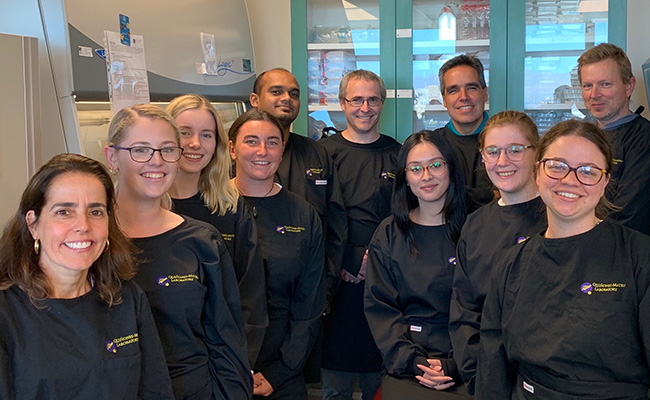Tuesday 7 April 2020 10:13am

Members of University of Otago Containment Lab team working on COVID-19.
A high-security Physical Containment Laboratory (PC3) at the University of Otago's Department of Microbiology and Immunology, is undertaking research to isolate and grow SARS-CoV-2, the virus responsible for COVID-19, with samples taken from infected individuals.
The PC3 laboratory is one of only a handful of its type in New Zealand, and is the only one growing and directly working on the novel coronavirus. The same group of researchers was also recently responsible for implementing a coronavirus test that was used to detect the first confirmed COVID-19 cases in Dunedin, a city at the south of New Zealand, and home to the University of Otago's main campus.
Principal Investigator, Professor Miguel Quiñones-Mateu, says after implementing the COVID-19 test in collaboration with Associate Professor James Ussher, the focus now has shifted to isolating the virus. A process he hopes will take days not weeks.
“Once we have the virus, we will extract its Ribonucleic Acid (RNA), to provide positive controls for diagnosis in all clinical laboratories across the country. We also want to study the biology of the virus, and evaluate antiviral and vaccine strategies”.
“It's a bit like identifying everything in an engine so you know exactly how to make it work, or in our case, how to break or stop it,” Professor Quinones-Mateu says.
The PC3 laboratory is a maximum security facility shipped from Europe to Otago in 2011, and lifted by crane on to the roof of one of the University of Otago's science buildings. With state of the art containment, ventilation, training, and safety systems and procedures to ensure maximum security, it allows researchers to work with the actual viral agent causing this disease. Previously the laboratory has been used to study live pathogens such as tuberculosis. For now, during the Level 4 lockdown in New Zealand, it is entirely dedicated to studying COVID-19.
A relatively small team, led by Professor Quiñones-Mateu and Postdoctoral Fellow Rhodri Harfoot, from the University's Department of Microbiology and Immunology are currently donning hazardous material suits, and rotating in shifts as they investigate the virus.
“Being virologists, and focusing on emergent viruses relevant to New Zealand, it was a no-brainer for our group to work with this virus. We can't sit back and wait for others to do this very important job, we can and should be doing it here,” Professor Quiñones-Mateu says.
Professor Quiñones-Mateu believes one of the biggest challenges about COVID-19 is how easily the virus is able to transmit. “The thing that makes it different from influenza or measles is that it is novel: we don't have existing immunity to this virus, it is completely new,” he says.
Isolating and growing the virus will open the door to establish productive collaborations with a multitude of institutions in New Zealand, including academic, clinical, and corporate sectors to help combating the pandemic. This process is being mirrored in similar leading laboratories across the world.
“Numerous research groups, many based on collaborations between industry and universities, are working on close to 100 different approaches to block the replication of the virus, looking to cure people with COVID-19.”
Professor Quiñones-Mateu adds that there are also approximately 50 different vaccine approaches being tested right now, at least two of them already in clinical trials.
CCTV footage from inside the PC3 laboratory as a researcher goes about tasks. Credit: University of Otago.
For more information contact:
Professor Miguel Quiñones-Mateu
Webster Family Chair in Viral Pathogenesis
Associate Dean Research
Department of Microbiology and Immunology
University of Otago
Tel +64 3 479 7703
Email miguel.quinones-mateu@otago.ac.nz
Mark Hathaway
Senior Communications Adviser
University of Otago
Mob +64 21 279 5016
Email mark.hathaway@otago.ac.nz
FIND an Otago Expert
Use our Media Expertise Database to find an Otago researcher for media comment.